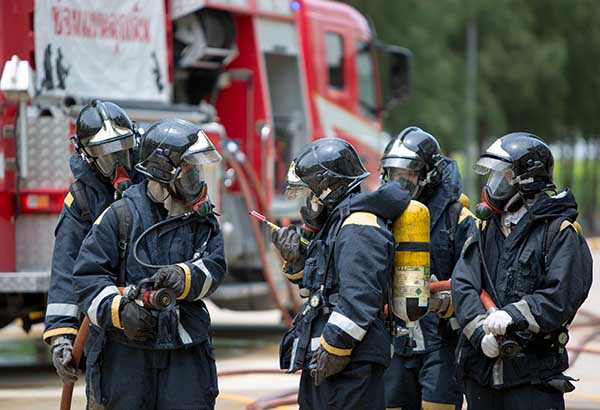
An Intensive 5-day Training Course
Strategic Crisis Management :
Incorporating Security & Major Emergency Response
Essential Skills for all Emergency Responders
Scheduled Dates
Classroom
| 30 Mar-03 Apr 2026 | Dubai - UAE | $5,950 | RESERVE A SEAT |
| 06-10 Apr 2026 | Riyadh - Saudi Arabia | $5,950 | RESERVE A SEAT |
| 11-15 May 2026 | London - UK | $5,950 | RESERVE A SEAT |
| 27-31 Jul 2026 | Istanbul - Turkey | $5,950 | RESERVE A SEAT |
| 21-25 Sep 2026 | Riyadh - Saudi Arabia | $5,950 | RESERVE A SEAT |
| 12-16 Oct 2026 | Barcelona - Spain | $5,950 | RESERVE A SEAT |
| 14-18 Dec 2026 | London - UK | $5,950 | RESERVE A SEAT |
| 01-05 Feb 2027 | Tokyo - Japan | $6,950 | RESERVE A SEAT |
| 29 Mar-02 Apr 2027 | Dubai - UAE | $5,950 | RESERVE A SEAT |
| 10-14 May 2027 | London - UK | $5,950 | RESERVE A SEAT |
| 26-30 Jul 2027 | Amsterdam - The Netherlands | $5,950 | RESERVE A SEAT |
| 11-15 Oct 2027 | Barcelona - Spain | $5,950 | RESERVE A SEAT |
| 13-17 Dec 2027 | London - UK | $5,950 | RESERVE A SEAT |
Online
| 30 Mar-03 Apr 2026 | Online | $3,950 | RESERVE A SEAT |
| 27 Apr-01 May 2026 | Online | $3,950 | RESERVE A SEAT |
| 29 Mar-02 Apr 2027 | Online | $3,950 | RESERVE A SEAT |
| 26-30 Apr 2027 | Online | $3,950 | RESERVE A SEAT |
Would an alternative date be more suitable?
We offer a variety of tailored training options, customized to meet your organisation's needs. Delivered anytime, anywhere, we make it easy to bring expert training directly to your team.
Why Choose this Training Course?
Leaders of Crisis Management Teams (CMT) and Emergency Response Teams (ERT) must have timely, relevant, and accurate information to make critical decisions effectively. Strong crisis leadership has consistently demonstrated its value over the years. As organizations face an increasingly complex range of potential emergencies that could disrupt operations and impact global reputation, the need for effective crisis management has never been greater.
This training course provides participants with the knowledge and tools to navigate Strategic Crisis Management. It focuses on defining objectives, making informed decisions, and leveraging authentic leadership skills to manage crises successfully.
This Strategic Crisis Management : Incorporating Security & Major Emergency Response training course will feature:
- Mastering the four essential aspects of emergency response
- Applying the five levels of leadership to maximize team effectiveness
- Understanding the 14 key attributes of an effective crisis leader
- Identifying and avoiding common crisis mismanagement pitfalls
- Quickly assessing options, making critical decisions, and adapting standards
- Evaluating psychological readiness, discipline, and leadership in high-pressure situations
What are the Goals?
By the end of this Strategic Crisis Management : Incorporating Security & Major Emergency Response training course, participants will be able to:
- Gain a comprehensive understanding of Strategic Crisis Management
- Develop structured strategies to ensure a prompt and effective crisis response
- Identify five critical leadership behaviors that can hinder crisis management and six strategies for success
- Apply the five core functional areas of an Incident Command System
- Design and implement multi-agency crisis response exercises for improved collaboration
- Utilize advanced leadership techniques to enhance decision-making under pressure
Who is this Training Course for?
Anyone who find themselves responsible for leading on, or implementing Crisis Management, Emergency Response and Business Continuity / Recovery mechanisms.
This PetroKnowledge Strategic Crisis Management : Incorporating Security & Major Emergency Response training course is suitable to a wide range of professionals but will greatly benefit:
- Fire Management Professionals
- Security Management Professionals
- Health, Safety and Environment Personnel
- Operation, Asset and Facility Professionals
- Risk, Marketing and Insurance Professionals
- Designated Incident, Emergency and Crisis Response Professionals
- Line Managers and Supervisors and other professionals wishing to appraise their comprehension of Emergency Response
- Professionals who have been allocated crisis management tasks yet have had insufficient time to devote to the subject
How will this Training Course be Presented?
This Strategic Crisis Management : Incorporating Security & Major Emergency Response training course will utilise a variety of proven adult learning techniques to ensure maximum understanding, comprehension and retention of the information presented. This fully participative and enjoyable event will enhance your leadership capabilities through assessments, syndicate role playing, group discussions, crisis communication skills and team problem solving challenges.
Daily Agenda
Day One to Day Five:
- Understanding Strategic Crisis Management
- Consider the complete range of risks to your organisation
- CMT and ERT - Roles & Responsibilities
- Security Management & Asset Protection
- Case Studies, why some companies fail, and others survive
- Based on the previous module, self-evaluation questionnaire
- Incident Command Systems (ICS)
- On Scene Crisis Management, essential elements for success
- Emergency Communication Centres, avoiding the ten most common mistakes
- Alerting and Warning
- Evacuation Strategies
- Major Incident Simulation - Role Playing Workshop
- Case Studies x 2 with the same root cause, are we learning?
- Exercises: a programme of learning and of validating plans and procedures;
- How to get advantageous results from an exercise
Certificate
- On successful completion of this Training Course / Online Training Course, a PetroKnowledge Certificate / E-Certificate will be awarded to the delegates.
